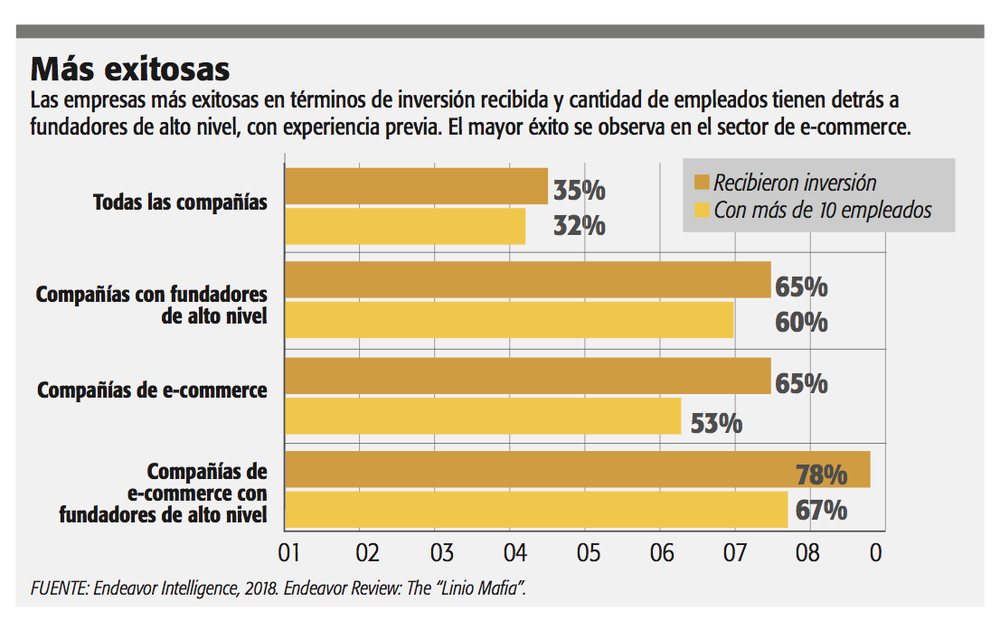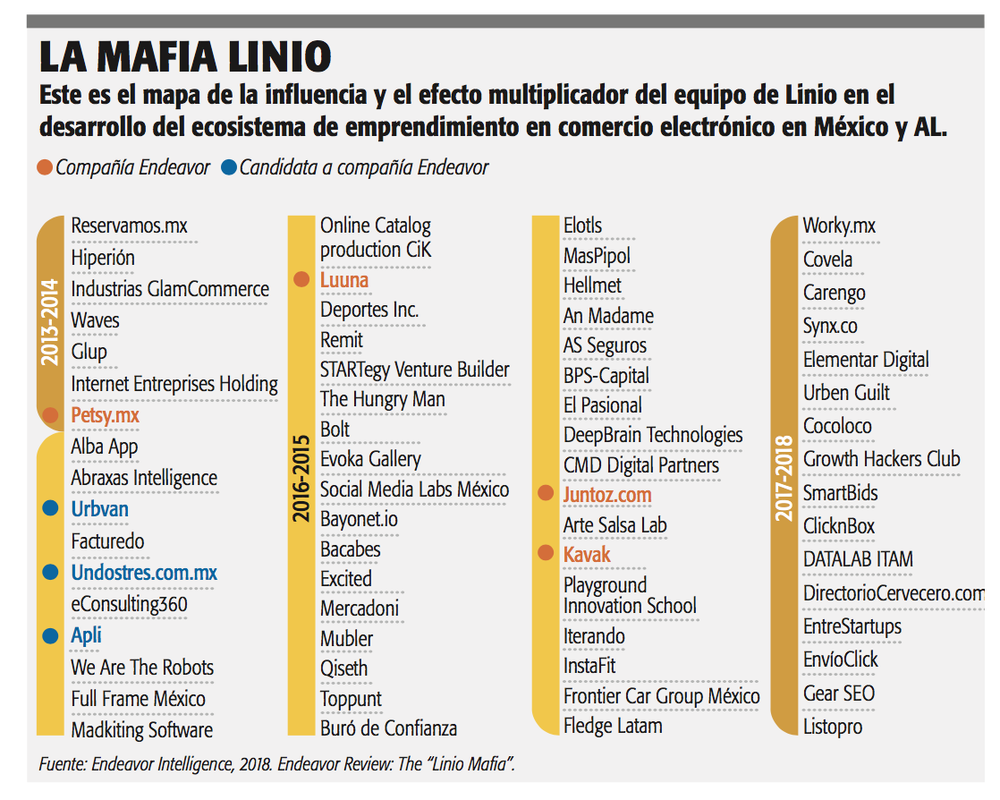Opinions expressed by Entrepreneur contributors are their own.
We have all heard about the history of the PayPal Mafia .
The PayPal Mafia is a term used to refer to the original team of the company made up of an extraordinary group of entrepreneurs such as Peter Thiel, Elon Musk, Reid Hoffman, Steve Chen, David Sacks and many more former employees, who generated a multiplier effect in the ecosystem by investing in the next generation of entrepreneurs and by going out to found successful companies that we recognize today as YouTube, Tesla, SpaceX, LinkedIn and Yelp , among others.
But the story of a company that generates a group of entrepreneurs whose culture of innovating and building an industry from scratch has a multiplier effect on the entrepreneurial ecosystem and the economy is not exclusive to PayPal or Silicon Valley. In fact, a clear case can be found in Mexico City: Linio.
The first Endeavor Review “The ‘Linio Mafia’ One Mexican Company’s Multiplier Effect” , studies the influence and multiplier effect of the Linio team in the development of the e-commerce entrepreneurship ecosystem in Mexico and Latin America.
The multiplier effect explains how entrepreneurs and businessmen drive the growth of an industry, sector or city through investment, mentoring, serial entrepreneurship and companies founded by former employees.
To study this effect, Endeavor collected and analyzed data on former Linio employees and their startups. Additionally, he interviewed three key players in the founding of the company: Ulrick Noel, former co-CEO and founder of Rocket Internet; Bernardo Cordero, co-founder and former CEO of Linio, and Carlos García Ottati, chief marketplace officer (CMO) and former CEO of Grupo Linio.

Linio in Mexico
With the support of the new Rocket Internet Mexico headquarters, Linio opened operations in 2012 as one of the first players in the e-commerce market.
Before Linio, the general perspective in the industry was that Mexicans did not like to buy online, but for Linio it represented a neglected opportunity as there was no adequate platform to buy from and with a wide range of products. Being the pioneers in the industry, they had to build, develop and innovate. The culture within Linio’s team had to be consistent with this.
Linio’s team had to create support systems in logistics and payment, promote the cultural adoption of electronic commerce and train an inexperienced workforce that, according to Cordero, García and Noel, was Linio’s biggest impact, creating a unprecedented digital talent.
Bernardo Cordero explains: “One part that is little talked about is all the impact [Linio] had on the real ecosystem — in terms of payments, logistics, and getting customers used to buying online. Someone had to invest, someone had to open the market, and that, without a doubt, was Linio. ”

Multiplying effect in figures
The research identified 66 companies founded by Linio’s employees or founders in Latin America.
The ventures that the “Mafia Linio” has generated in the ecosystem include e-commerce platforms (Togetherz and Mercadoni), some focused on particular verticals such as the sale of pet products (Petsy.com), cars (Kavak) and mattresses (Luuna) . Others facilitate business processes such as personnel hiring (Apli), product delivery (CorreoClick), human resources (Worky.mx) and insurance (Covela). In addition, a fourth are digital agencies that provide a wide variety of services related to ecommerce and digital marketing.
Of the 66 companies, 70% are located in Mexico, 66% were founded in 2015 and 2016, and 30% were created by founders and former Linio executives. In addition, 47% operate in the ecommerce sector, 32% have more than 10 employees, 6% have more than 10 connections to Linio and 35% have received investment.
Of all of them, the most successful in terms of investment received and number of employees, work in the ecommerce sector , were developed by one of the founders or executives of Linio or both. Companies with more connections to Linio are also more successful.

Where is the “Linio Mafia” today?
Today we can find various success stories belonging to the “Linio Mafia”. For example, Ulrick Noel co-founded Everdeen Capital, an investment bank focused on long-term relationships; Bernardo Cordero founded STARTegy Venture Builder, which creates new companies in the fintech sector, and Carlos García Ottati is co-founder, CEO and Chairman of Kavak, a platform that facilitates the purchase and sale of used cars.
Kavak is one of the most successful cases of the “Linio Mafia.” Carlos started the company in 2016 with Roger Laughlin Carvallo, former sales managing director of Linio. Currently, the platform has 150 employees, has received $ 16 million in investment and is part of the Endeavor network.
Another success story is Luuna, founded in 2015 with three former Linio executives: Guillermo Villegas, William Kasstan and Carlos Salinas. Luuna is causing a disruption in the rest industry, standing out for its online mattress sales model. It has 44 employees and has received 115 million pesos in investment. They are also within the Endeavor network.
In 2013, Olivier Scialom, former marketing manager of Linio LATAM, co-founded Petsy.mx, the main online site that offers pet products in Mexico. In July 2018, Petsy.mx was acquired by Maskota, the largest pet products store in Mexico. The founders of Petsy are Endeavor Entrepreneurs.
Other examples include former Grupo Linio CMO Jose Maria Pertusa, who founded Apli; the former director of Mobile LATAM de Linio, Naveen Sharma and the former director of Pricing LATAM, Vikram Deswal, who founded UnDosTres, and the former head of Marketing Electronics LATAM, Joao Matos Albino, who founded Urbvan.

Beginning of awakening
After building the e-commerce ecosystem, the “Linio Mafia” continues to stimulate the growth of the sector, both outside and within its network.
Despite the impressive growth exhibited by “Mafia Linio” companies, some still believe that the e-commerce market in Mexico is just beginning to wake up. Consumers and investors are getting closer and closer to the sector and companies are beginning to scale.
According to Carlos García, “this mafia is going to continue forward. It is just beginning. I believe that in five years we will begin to see the flow of this Linio Mafia ”.
Linio’s case must be judged from the impact it generated on ecommerce in Mexico, by building and developing teams with a high capacity to create and innovate, thus forming a digital talent that today permeates the entrepreneurship ecosystem and that generated a network of people who start new companies, give and receive mentorship, who are clients and suppliers and invest with each other.
Endeavor seeks that this multiplier effect is applicable to countries, cities, governments, civil associations and international philanthropic institutions, interested in facilitating the economic and cultural development of the country through high-impact entrepreneurship as the greatest catalyst.
Cultivating a prosperous ecosystem on any sector requires comprehensive development. Opening new paths within the economy requires support structures such as payment and logistics systems, the understanding and general adoption of consumers and allies, and also the training and acquisition of experience of professional talent.



